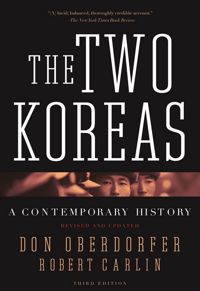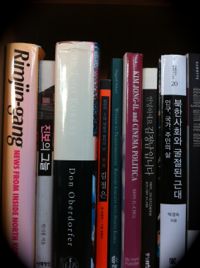 “The Two Koreas.” A 3rd edition was recently released by Basic Books (Image: Destination Pyongyang) |
Oberdorfer, Don and Robert Carlin. (2013). The Two Koreas: A Contemporary History (3rd edn.). New York: Basic Books.
Being asked to update an existing book may
be an honor, but it is surely a double-edged sword. The request itself confers
public respect upon the recipient; however, only the most impressive and
timeless texts get updated at all. Who would willingly sign up to try and
improve upon something that is universally well regarded?
In his 1997 Foreign Affairs review
of “The Two Koreas,” Donald Zagoria predicted that Washington Post correspondent
Don Oberdorfer’s trek through Korean Peninsula history
since the early 1970s would be “likely to stand as the most coherent, well-documented and insightful
book on contemporary Korea now available.” Zagoria was absolutely right; what is more, the book has stood the
test of time. Abnormally popular for a book about Korea, a second edition
followed hard on the heels of the first, and a third, updated edition has now emerged
more than a decade thereafter.
Richly footnoted (Zagoria points
approvingly to “judicious use of government documents
[and] more than 400 interviews with former U.S., Japanese and South Korean
government officials”), the first edition
describes the Korean Peninsula conflict, revealing in detail many of the economic and political twists and turns that have ensnared one small corner
of Northeast Asia since 1945, and arguably since long before that.
It looks at the process by which the people
of South Korea forged a path from profoundly flawed post-Korean War democracy
to the “developmental state” of Park Chung Hee and on, eventually and not without considerable
suffering at Gwangju and elsewhere, to a resilient and functioning form of liberal
democratic rule.
At the same time, it highlights the parallel track upon which
North Korea went from development at Chollima speed in the 1960s to
the nadir of a Kim family-inspired famine that cost countless lives (countless
in a literal sense, since the nature of the Korean conflict still does not
permit a final accounting of those lost to hunger and disease). It discusses
the Cold War struggle that raged in the background throughout the post-war
decades, and the nuclear debacle that came close to casting North Korea and the
United States into a second, potentially more ruinous Korean War than the
first.
The publishing industry is going through
tough times, however, and one result is that Robert Carlin, facing the task of augmenting
Oberdorfer’s work with the history of a tumultuous 21stCentury, was originally asked to add just 10% to the
400+ pages of the first edition. It was a mission as impossible as it sounds; as
a result, thirty pages have been sacrificed from the original prose to make
way. The font size has also been reduced, and there has been a deliberate move
away from extensive footnoting.
 A common sight: a bookshelf containing an old first edition of “The Two Koreas.” (Image: Destination Pyongyang) |
Unfortunate though such editorial shifts may be, the
finished third edition does achieve the stylistic goals of the
project: the rhythm and voice of Oberdorfer’s writing has, by and
large, been retained. The urgency of first-hand knowledge is still present,
too; given Carlin’s history as an analyst for the CIA, State Department official, and
participant in negotiations with North Korea during the first nuclear crisis,
this is hardly surprising.
First-hand knowledge always carries a
cost, however. Carlin could scarcely have been expected to take an ambivalent
stance on the disdain for engagement felt by presidents George Bush Jr. and Lee Myung Bak, for instance, and so it proves.
However, as he points out in an exclusive interview to be published by Daily NK
on January 18th, Oberdorfer was not above making value judgments, either. Forewarned
is forearmed, then, and knowledgeable readers will surely be able to factor the weighty Carlin
CV into their reading experience.
There are a handful of obvious absences, as well; most notably, China receives limited mention, apparently due to publishing restrictions rather than authorial
choice. But an even more serious absence is one the author, much to his regret, had no hope of resolving: the lack of the North Korean leadership’s own voice. Carlin tried to involve officials from the North in the production
process, just as he went to great lengths to involve so many from elsewhere, including Daily NK. But it
was not to be.
As he comments in the preface to this
impressive but unbalanced update, it is to be hoped that one day the
North Korean authorities will realize that silence is by no means golden, that “a history of their country written without them does them no favors.” Whether they would tell the truth under such circumstances is another matter, of course, but how much better it would be were they to try. Alas that day remains distant, and the story of the Korean Peninsula continues without, and yet inseparable from, them.

















